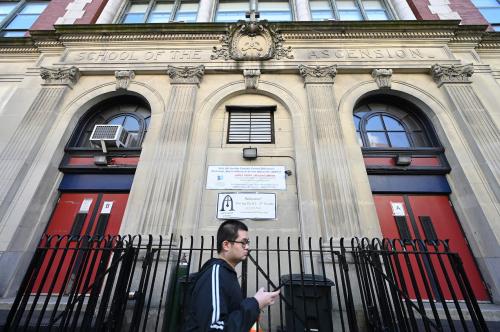After decades, if not centuries, of relative distance from Latin America, the leadership of the European Union (EU), as well as German Chancellor Angela Merkel, Spanish President Mariano Rajoy, French Prime Minister Jean-Marc Ayrault, Portugese Prime Minister Pedro Passos Coelho, senior ministers from Ireland and the U.K. will participate this weekend in a summit between European leaders and the presidents of Chile, Mexico and Colombia and their respective delegations in Santiago, Chile. Their counterpart in this summit is the Community of Latin America and the Caribbean (CELAC). Both the United States and Canada will be observers at this meeting because neither is a member of CELAC. What is the significance of this meeting and what might be achieved? Should the United States be concerned at finding itself excluded?
First, this meeting is the first time that European leaders fly to South America with the specific intent of “doing business” in the western hemisphere. Instead of heading up the mountain to the World Economic Forum at Davos, the leaders fly westward. After decades of focus on European challenges, the leadership has recognized the potential of the western hemisphere, with its 575 million people and $6.8 trillion GDP, for trade and investment. They recognize that Latin America has changed significantly since the 1980s when protectionist trade policies and rigid exchange rates made this hemisphere a less attractive place to do business. Sound macro-economic policies, strong reserves, flexible exchange regime and invitations to invest in energy, communications and infrastructure have radically changed the perspective of foreign traders. Nearly all countries in the western hemisphere are now “open for business.” Therefore, accompanying government leaders is a delegation of European CEOs representing GDF Suez, Endesa, InterEnergy Holding, KGHM Polska Miedz, among others.
Apart from the final Summit Declaration on January 27, which we should expect to commit to future summitry, close collaboration on climate change and the need to strengthen financial security, the discussions between business leaders over specific investment projects present real opportunities for joint ventures. Electrical grids will be designed, machinery will be purchased, communications equipment and software will be developed on both sides of the Atlantic. European business is wide awake to the potential for business in South America, as well as Mexico.
Should Washington care? Yes. This is a wake up call from entrepreneurs who compete with U.S. manufacturers, scientists and engineers. The Europeans have not arrived at the CELAC meeting to buy primary commodities. They have flown over to explore ways in which to combine their management skills and funds with the opportunities presented by energetic entrepreneurs, known as “multi-latinos.” They will find governments, such as the Mexico’s and Colombia’s, who understand fully the value of foreign direct investment, scientific and technological expertise. They will communicate in languages and cultures that are compatible with South American values.
U.S. business needs to play a leadership role and not wait for Washington to organize the next delegation. The U.S. Chamber of Commerce, the Business Roundtable, the Council of the Americas can stimulate their members to visit Mexico, Colombia, Peru, Chile, Uruguay and Brazil with a view to doing business. Medium size businesses in the United States can access the support of the U.S. Foreign Commercial Service to find partners in the hemisphere. There is plenty of business opportunities for both the Europeans and the North Americans, but we must get off the couch and develop alliances and joint ventures. Otherwise, the Europeans might eat our lunch!
The Brookings Institution is committed to quality, independence, and impact.
We are supported by a diverse array of funders. In line with our values and policies, each Brookings publication represents the sole views of its author(s).



Commentary
Summitry between Europe and Latin America
January 25, 2013